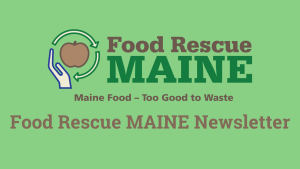Maine Home Food Waste Challenge
Join the Maine Home Food Waste Challenge and compete with your
fellow Mainers to reduce your household food waste – and become a Maine Food Waste Hero! Here’s how to get started.
Instructions
- Use or borrow any 5 gallon bucket (good), a bathroom scale used for body weight (better) * or a countertop food scale (best) for weighing or estimating food waste.
- Set up a lidded or sealable container (a large bowl with lid to store in fridge, a lidded countertop compost container, a lidded 5 gallon bucket to keep outside door, or even a brown grocery bag lined with a plastic bag) to collect all food waste separate from your normal trash container. Weigh your empty container in pounds (lbs.).**
- Starting on Monday, Jan. 9, collect all your food waste (edible, inedible, scraps, trims – but no liquid, paper, wrap or packaging) into this separate food waste container.
- Every Sunday, weigh the container with your weekly food waste on your food scale. Subtract your container weight** to calculate your weekly Food Waste Weight (lbs.)
If want to get more precise data or if you have too much food waste, you can weigh it daily and then add up to get your weekly Food Waste Weight (lbs.) After weighing, please empty your food waste container — ideally at your community food waste drop-off site or in your backyard compost pile. Curbside composting services also offer weekly food waste pick-up in some Maine communities. Rinse your container and get ready to start next week’s food waste collection.
- Then, record your Food Waste Weight on the printable paper Challenge tracker (next page). For example, this is what week one might look like if there was a total of 5 lbs. of wasted food, with much of it being overbought bread:
| Week | Week 1 |
| Monday | 1.5 |
| Tuesday | 0 |
| Wednesday | 2 |
| Thursday | 1 |
| Friday | .5 |
| Saturday | 0 |
| Sunday | 0 |
| Total/ Notes | 5 pounds, unused bread! |
Also, note the causes of your weekly food waste, and try to change your shopping, storage or cooking practices the following week to reduce your waste (see Food Waste Tips, pg. 3 or check our Facebook page.)
- When you receive our weekly Maine Home Food Waste Challenge Data Request email each Sunday, please submit that week’s Food Waste Weight data
- Check your Challenge progress on Mondays on our Challenge Leaderboard –- will you be a Maine Food Waste Hero? Note any helpful tips and ideas, and get ready for a new week of food waste reduction.
* If you don’t have a food scale for weighing, here are two other options:
- Better – Bathroom Scale: Just weigh yourself holding your empty food waste container; this is your Weight A. Then each week, weigh yourself holding your full food waste container; this is your Weight B. Subtract your Weight A from your Weight B to calculate your Food Waste Weight.
Food Waste Weight = Weight B (full) – Weight A (empty)
- Good – 5 Gallon Plastic Bucket (e.g., like an orange HD bucket or any old utility bucket): Estimate your Food Waste Weight by noting how much of your bucket is filled each week. An average 5 gallon bucket full of food waste weighs 19 lbs. If your bucket is half full, your Food Waste Weight = 9.5 lbs. or ¼ full = 4.25 lbs. and so on.
Keep up your great work it’s just a short 4 weeks –- reducing food waste and saving you money and helping the planet, one container of at a time!

